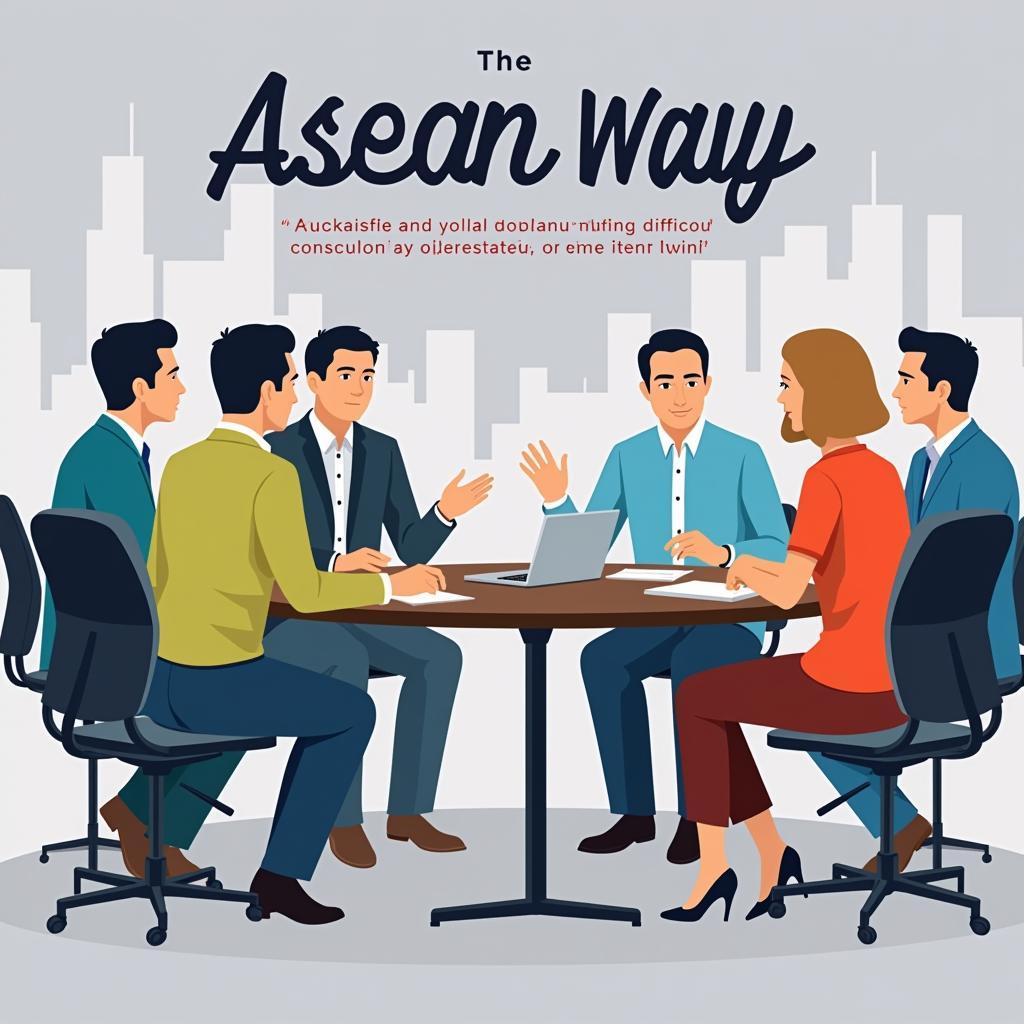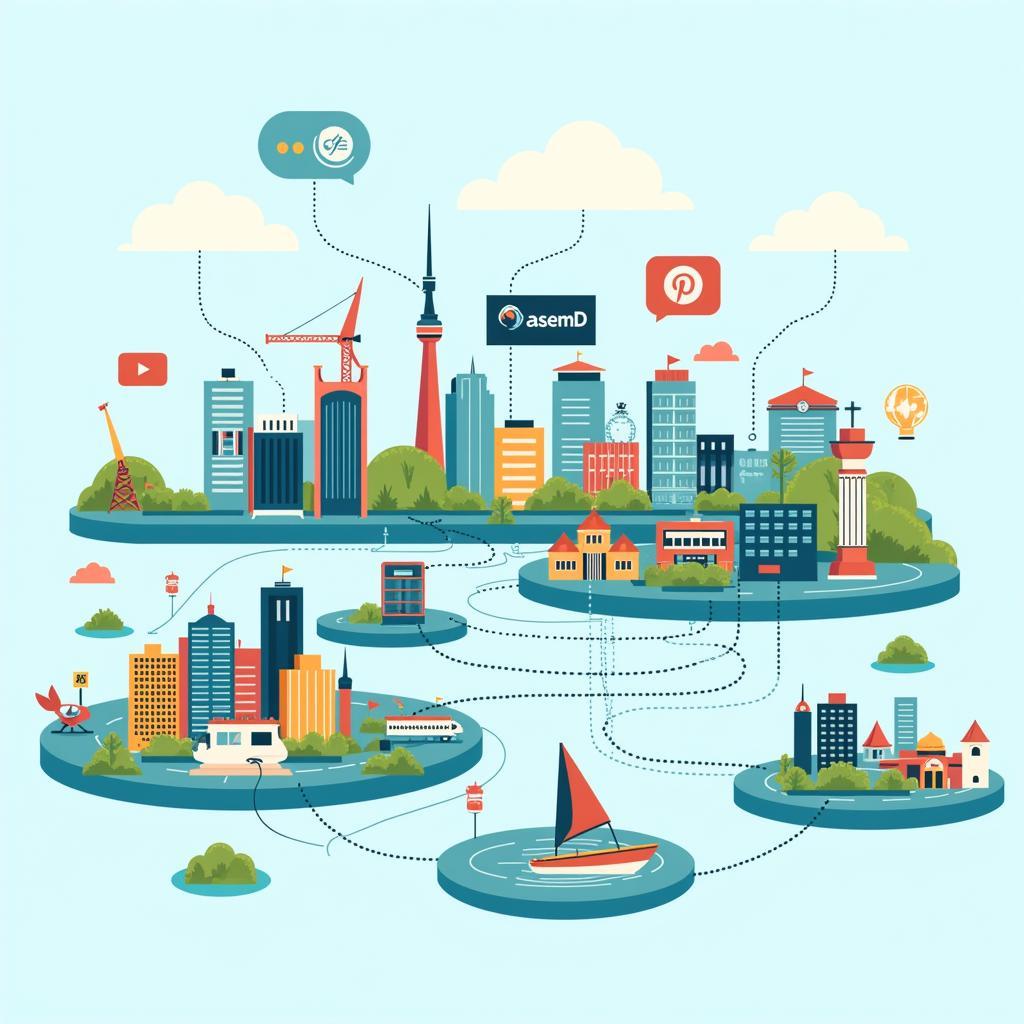“Apa Yang Dimaksud Dengan The Asean Way” translates to “What is meant by the ASEAN Way” in Indonesian. This seemingly simple question opens the door to a complex and fascinating exploration of the core principles guiding the Association of Southeast Asian Nations (ASEAN). It’s about understanding the unique approach to regional cooperation and diplomacy that has shaped the organization and its impact on Southeast Asia for over five decades.
Decoding the ASEAN Way: A Unique Approach to Diplomacy
The ASEAN Way refers to the set of diplomatic norms, informal consultations, and consensus-based decision-making that characterizes ASEAN’s operations. It prioritizes non-interference in internal affairs, peaceful conflict resolution, and a preference for informal dialogue over formal disputes. It’s a delicate balance of respecting national sovereignty while fostering regional unity. This approach, while sometimes criticized for its perceived slow pace, has been instrumental in maintaining peace and stability in a region marked by diverse political systems, cultures, and historical experiences.
The Key Principles of the ASEAN Way
Several key principles underpin the ASEAN Way. These include:
- Musyawarah and Mufakat (Consultation and Consensus): Decisions are reached through thorough consultations and a strive for consensus, avoiding voting or imposing the will of the majority. This allows all member states to feel heard and valued.
- Non-Interference: Member states refrain from interfering in the internal affairs of one another. This principle acknowledges the diversity of political systems and respects national sovereignty.
- Peaceful Dispute Settlement: ASEAN promotes the peaceful resolution of disputes through dialogue, negotiation, and mediation, avoiding confrontation.
- Informal and Flexible Approach: ASEAN prefers informal and flexible methods of interaction, fostering a spirit of cooperation and understanding.
 ASEAN Way Consultation and Consensus
ASEAN Way Consultation and Consensus
Why is the ASEAN Way Important?
The ASEAN Way has been crucial to the organization’s success in navigating complex regional challenges. It has fostered a sense of community and shared purpose among member states, enabling them to address issues collectively and build trust. This approach has also allowed ASEAN to engage with external partners on its own terms, enhancing its regional and international standing.
“Apa yang Dimaksud dengan The ASEAN Way” in Practice: Examples and Challenges
Understanding “Apa yang dimaksud dengan The ASEAN Way” requires looking at how these principles translate into real-world situations. For example, ASEAN’s response to the South China Sea disputes demonstrates the organization’s commitment to peaceful dialogue and negotiation. While progress can be slow, the ASEAN Way encourages finding common ground and managing differences without escalating tensions.
Challenges to the ASEAN Way
The ASEAN Way faces ongoing challenges, such as differing economic development levels, varying political systems, and external pressures. Critics argue that the emphasis on consensus can lead to inaction on critical issues. However, proponents maintain that it’s essential for maintaining unity and stability in a diverse region.
The Future of the ASEAN Way
As ASEAN continues to evolve, the ASEAN Way will likely adapt to meet new challenges and opportunities. Maintaining the core principles of consensus, non-interference, and peaceful dispute settlement will be crucial for the organization’s future success. This will involve addressing issues like climate change, economic integration, and cybersecurity collectively while upholding the values that have defined ASEAN’s unique approach to regional cooperation.
“The ASEAN Way is not about uniformity but unity in diversity. It’s about finding common ground while respecting differences.” – Dr. Anisa Hasan, Southeast Asian Studies expert.
How the ASEAN Way Benefits the Region and the World
The ASEAN Way promotes regional stability and economic growth, attracting foreign investment and enhancing cooperation. It serves as a model for other regional organizations navigating complex geopolitical landscapes.
“The ASEAN Way demonstrates that diplomacy and dialogue can be powerful tools for building bridges and promoting peace.” – Professor Budi Santoso, International Relations scholar.
Conclusion: The Enduring Relevance of the ASEAN Way
Understanding “apa yang dimaksud dengan The ASEAN Way” is essential for comprehending the dynamics of Southeast Asia. The ASEAN Way, despite its challenges, remains a cornerstone of regional cooperation. Its emphasis on consensus-building, non-interference, and peaceful dispute settlement provides a framework for navigating complexities and fostering stability in a dynamic and diverse region. This approach will continue to be crucial in shaping ASEAN’s future and its contribution to a peaceful and prosperous world.
FAQ
- What are the core principles of the ASEAN Way? The core principles include musyawarah and mufakat (consultation and consensus), non-interference, peaceful dispute settlement, and an informal and flexible approach.
- Why is the ASEAN Way important? It fosters regional stability, promotes peaceful conflict resolution, and strengthens cooperation among member states.
- What are some challenges to the ASEAN Way? Challenges include differing economic development levels, diverse political systems, and external pressures.
- How does the ASEAN Way benefit the world? It provides a model for regional cooperation and contributes to global peace and stability.
- What is the future of the ASEAN Way? The ASEAN Way is expected to adapt to meet new challenges while upholding its core principles.
- How does the ASEAN Way impact decision-making? It emphasizes consensus-based decision-making, ensuring all member states have a voice.
- Where can I find more information about ASEAN? The official ASEAN website and reputable academic resources provide further insights.
Need support? Contact us 24/7: Phone: 0369020373, Email: aseanmediadirectory@gmail.com, Address: Thon Ngoc Lien, Hiep Hoa, Bac Giang, Vietnam.
